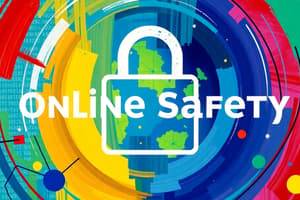Podcast
Questions and Answers
What does netiquette refer to?
What does netiquette refer to?
- Techniques for improving internet speed
- The characteristics of online communities
- The rules of conduct for respectful communication online (correct)
- The nature of online business transactions
What is the primary function of a keylogger?
What is the primary function of a keylogger?
- To prevent malware from entering the system
- To provide system updates automatically
- To record user keystrokes for stealing sensitive information (correct)
- To improve computer performance
How does the ILOVEYOU Worm spread?
How does the ILOVEYOU Worm spread?
- By disguising itself as a helpful app
- Through email attachments to unsuspecting users (correct)
- Through direct user downloads only
- By replicating itself across multiple computers
What distinguishes malicious software from regular software?
What distinguishes malicious software from regular software?
Which of the following is not an example of malicious software?
Which of the following is not an example of malicious software?
What threat does ransomware pose?
What threat does ransomware pose?
What type of malicious software is Fireball classified as?
What type of malicious software is Fireball classified as?
What is a significant risk associated with internet threats?
What is a significant risk associated with internet threats?
What is one of the main goals of ransomware like Slocker?
What is one of the main goals of ransomware like Slocker?
What should you do before posting something online?
What should you do before posting something online?
Which of the following is NOT a recommended practice for staying safe online?
Which of the following is NOT a recommended practice for staying safe online?
How can you protect yourself from digital risks?
How can you protect yourself from digital risks?
What is a common misconception about using public Wi-Fi?
What is a common misconception about using public Wi-Fi?
What should you do about potential malware emails?
What should you do about potential malware emails?
What action can you take to decrease the likelihood of being hacked?
What action can you take to decrease the likelihood of being hacked?
What is a guideline for using social networking sites safely?
What is a guideline for using social networking sites safely?
Flashcards
Netiquette
Netiquette
Rules for respectful communication on the internet.
Internet Threats
Internet Threats
Dangers that compromise online safety and privacy.
Malicious Software
Malicious Software
Programs that damage or disrupt computer operations.
ILOVEYOU Worm
ILOVEYOU Worm
Signup and view all the flashcards
Trojan (Triada)
Trojan (Triada)
Signup and view all the flashcards
Keylogger
Keylogger
Signup and view all the flashcards
Fireball
Fireball
Signup and view all the flashcards
Ransomware
Ransomware
Signup and view all the flashcards
Slocker
Slocker
Signup and view all the flashcards
Phishing
Phishing
Signup and view all the flashcards
Copyright Infringement
Copyright Infringement
Signup and view all the flashcards
Digital Self-Protection
Digital Self-Protection
Signup and view all the flashcards
Private Profiles
Private Profiles
Signup and view all the flashcards
Avoiding Public Wi-Fi
Avoiding Public Wi-Fi
Signup and view all the flashcards
Reading Terms and Conditions
Reading Terms and Conditions
Signup and view all the flashcards
Antivirus Software
Antivirus Software
Signup and view all the flashcards
Study Notes
Online Safety, Security, Ethics, and Etiquette
- The internet is a powerful tool for business, friendship, and entertainment.
- However, it also presents dangers if users aren't careful.
- Online safety involves protecting yourself from risks like cyberbullying, phishing, scams, and harmful content.
- It includes using strong passwords, avoiding suspicious links, and being mindful of shared personal information.
Netiquette
- Netiquette is a set of rules for respectful and appropriate online communication.
- It's like online etiquette.
Internet Threats
- Internet threats encompass various dangers and risks that compromise online safety, security, and privacy.
- These threats can target individuals, businesses, or systems, resulting in data breaches, financial loss, or identity theft.
- Examples include malware, viruses, worms, Trojans, spyware, adware, ransomware, spam, and phishing.
Malware
- Malware is any program or file designed to harm a computer user.
- Specific types include viruses, worms, Trojans, spyware, adware, and ransomware.
Types of Malware
- Virus: A malware that replicates itself and transfers from one computer to another. Examples include Agent Smith.
- Worm: A malware that transfers from one computer to another. Examples include the ILOVEYOU worm.
- Trojan: A malware that disguises as a useful program, downloads, or installs leaving the PC unprotected and allowing hackers to access your information. Example: Triada on Android devices.
- Spyware: A program that runs in the background without user knowledge, monitoring user activities and typing, often through keylogging. Keylogger is a type of spyware.
- Adware: A program that displays advertisements, often as pop-ups, can slow down devices and track user activity. Example: Fireball.
- Ransomware: Malicious software that can encrypt or block access to a victim's data unless a ransom is paid. Example: Slocker.
- Spam: Unwanted emails mostly from bots or advertisers, sometimes used to distribute malware.
- Phishing: Attempts to acquire sensitive personal information like passwords and credit card details by sending fake emails or websites.
Copyright Infringement
- This is the use of copyrighted works without permission.
- It involves protecting works and obtaining permission before using copyrighted material.
- Tips to avoid copyright infringement include assuming all works are copyrighted, avoiding copying or altering without permission, reviewing and retaining licensing agreements, considering buying content, and crediting original authors.
Protecting Online Reputations
- Before posting online, consider if parents, grandparents, or future employers might see it.
- If a post is harmful, it can be reported as inappropriate, or asked to be removed.
Online Safety Tips
- Be mindful of what you share, avoiding giving personal information, and being careful about the sites you share information on.
- Understanding security features of used online sites can be helpful in protecting privacy.
- Avoid sharing passwords or logging into risky Wi-Fi. Never talk to strangers online or in person. Avoid discussing future trips or plans. Add friends in real life, rather than only online. Be wary of untrusted websites.
- It is important to have a single antivirus software on a computer to help avoid conflicts.
Studying That Suits You
Use AI to generate personalized quizzes and flashcards to suit your learning preferences.




